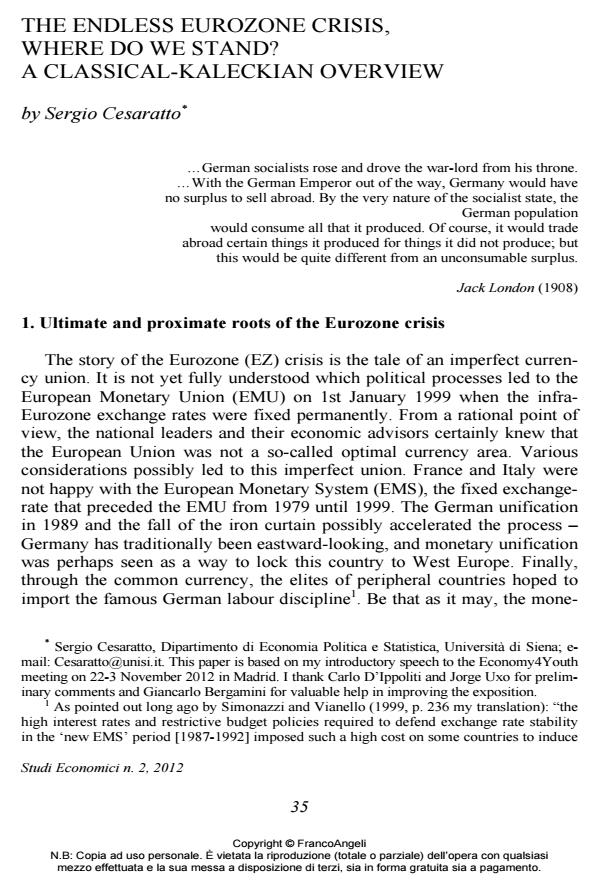The endless eurozone crisis, where do we stand? a classical-kaleckian overview
Titolo Rivista STUDI ECONOMICI
Autori/Curatori Sergio Cesaratto
Anno di pubblicazione 2013 Fascicolo 2012/107
Lingua Inglese Numero pagine 29 P. 35-63 Dimensione file 557 KB
DOI 10.3280/STE2012-107002
Il DOI è il codice a barre della proprietà intellettuale: per saperne di più
clicca qui
Qui sotto puoi vedere in anteprima la prima pagina di questo articolo.
Se questo articolo ti interessa, lo puoi acquistare (e scaricare in formato pdf) seguendo le facili indicazioni per acquistare il download credit. Acquista Download Credits per scaricare questo Articolo in formato PDF

FrancoAngeli è membro della Publishers International Linking Association, Inc (PILA)associazione indipendente e non profit per facilitare (attraverso i servizi tecnologici implementati da CrossRef.org) l’accesso degli studiosi ai contenuti digitali nelle pubblicazioni professionali e scientifiche
It is not easy to untangle the logic that in the past led to creation of the European Monetary Union (EMU) and that is currently guiding the prevailing Eurozone (EZ) policies. Although lacking the right institutions, which can be seen as the ultimate root of its crisis, the ten years of the EMU could be celebrated in 2008 with some fanfare. The EMU even seemed a success, judged from the point of view of imbalanced growth of some peripheral countries that masked its deflationary stance. This imbalanced growth was the proximate cause of the EZ financial crisis. In the paper we shall review the main causes of the EZ financial crisis, interpreted as a balance of payments crisis; the role of the European payment system TARGET 2 in buffering its violent blast; the Classical-Kaleckian rationale of the German malevolent mercantilism; the inadequate EZ policy measures to respond to the crisis; possible alternative solutions. Unfortunately, rather than pushing towards the creation of a different set of European institutions, the prevailing crisis resolution philosophy resembles a late vindication of the original deflationary Euro-bias.
Parole chiave:European Monetary Union, financial crisis, Germany, neomercantilism, sudden stops, TARGET 2
Jel codes:E11, E12, E42, E58, F32, F33, F34, F36, N24
- Global Food Security and Wellness Stefania Gabriele, pp.163 (ISBN:978-3-319-47963-7)
Sergio Cesaratto, The endless eurozone crisis, where do we stand? a classical-kaleckian overview in "STUDI ECONOMICI " 107/2012, pp 35-63, DOI: 10.3280/STE2012-107002